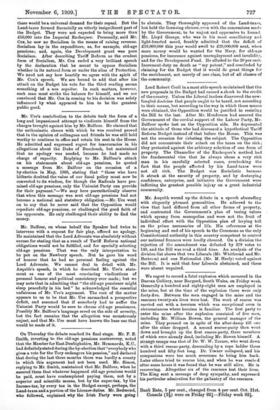Mr. Asquith wound up the debate in a speech abounding
with elegantly phrased generalities. He adhered to the view that land differed from all other forms of property, and contrasted the Government's plan of taxing values which sprang from monopolies and were not the fruit of individual effort with the Opposition plan of levying toll on the prime necessaries of lz:e. His ieferences at the beginning and end of his speech to the Commons as the only Constitutional authority in this country competent to control our national finances were loudly cheered. On a division the rejection of the amendment was defeated by 379 votes to 149, and the Bill was read a third time. An analysis of the division-list shows that two Liberals (Mr. Whitbread and Mr. Bertram) and one Nationalist (Mr. M. Healy) voted against the Bill. It is said that four Liberals abstained, and throe were absent unpaired.






























































 Previous page
Previous page